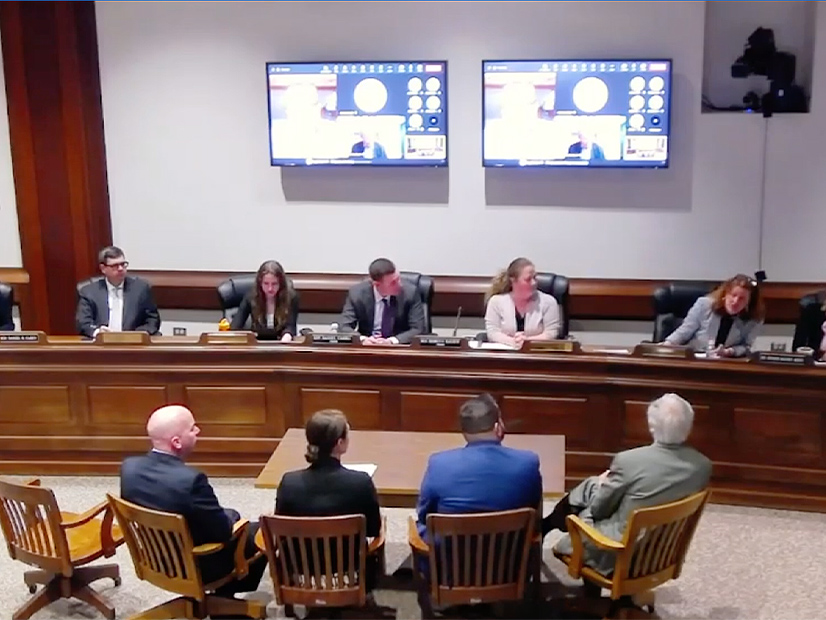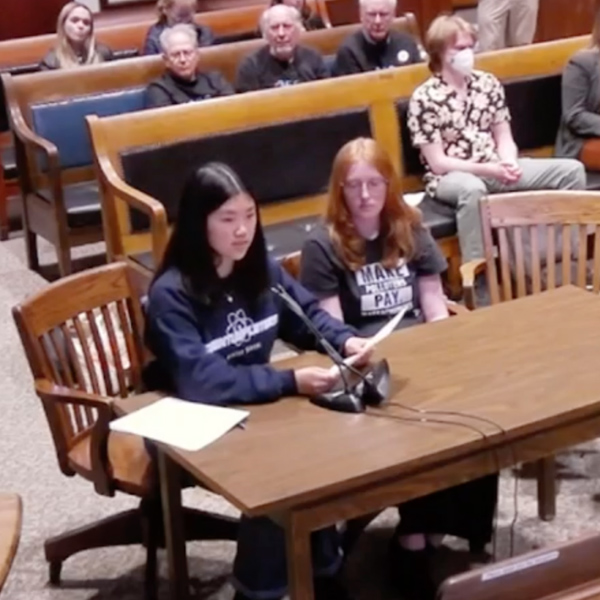
BOSTON — Massachusetts legislators and climate advocates called for a billion-dollar fine on the country’s largest carbon-polluting companies at a meeting of the legislature’s Joint Committee on Environment and Natural Resources on Wednesday.
The committee took public testimony on 44 bills from both houses concerning climate and energy policy. A large portion of the testimony focused on several bills that would fund and support climate resilience.
Prior to the hearing, climate activists rallied in front of the Statehouse in favor of Senate Bill 481 and House Bill 3581, which would create a “climate change superfund” by imposing fines on the largest carbon-emitting companies in the country based on their proportional shares of historic emissions. The fine would impact entities responsible for more than 1 billion tons of carbon-equivalent emissions and is designed to generate $75 billion over 25 years.
The fund would support projects such as seawalls, stormwater management upgrades, adaptation improvements to transportation and grid infrastructure, ecological restoration projects, and cleanup projects after storms.
“The question now is who is going to pay for the damage caused by climate change,” said Jon Grossman of SEIU local 509, which represents nearly 20,000 educators and service workers in the state. “If we don’t take appropriate action, this will come to a significant cost to taxpayers and also a significant cost to Massachusetts residents who rely on public services. …
“As we in the labor movement know, when we look around, we can see that there is money out there, and it seems that the folks that caused this crisis have a lot of it; fossil fuel companies are among the most profitable in the world,” Grossman added.
Similar legislation was proposed in 2021 by Democrats at the federal level and has been introduced at the state level this year in New York and Maryland. Representatives for groups, including the Massachusetts Youth Climate Council, Communities Responding to Extreme Weather, Massachusetts Climate Action Network, 350 Massachusetts, Elders Climate Action and the Mass Power Forward coalition, spoke in favor of the bills, highlighting the responsibility of major fossil fuel companies in driving the climate crisis and blocking climate action.
“It is well documented that at least Exxon hired scientists more than 30 years ago to study the effects of their product, found it was detrimental to all living species and then lied about it,” said Cabell Eames, political director of the Better Future Project. “The level of deceit is of epic proportions, and at this point to allow the fossil fuel industry to continue business as usual without holding them accountable is enabling an industry that has proven criminal in its wanton fraud and disregard for the human race.”
 Activists from the Massachusetts Youth Climate Coalition call on the committee to advance Senate Bill 481, which would impose a fee on the state’s largest climate polluters. | Mass. Joint Committee on Energy and Natural Resources
Activists from the Massachusetts Youth Climate Coalition call on the committee to advance Senate Bill 481, which would impose a fee on the state’s largest climate polluters. | Mass. Joint Committee on Energy and Natural ResourcesAnother bill focused on addressing climate fallout, filed as House Bill 750 and Senate Bill 472, would fund climate resilience projects by imposing a fee on property insurance, which advocates said would avoid financial burdens for low-income residents. Representatives of the Conservation Law Foundation, the Nature Conservancy, Mass Audubon, the North Central Climate Change Coalition and My Brother’s Table spoke in favor of the bill.
“While the funding proposed in this bill is only a small portion of what’s needed, its aim … is to turbocharge programs in Massachusetts that support, enhance and supplement climate adaptation and mitigation programs that have equitable goals and outcomes,” said Sam Anderson of Mass Audubon.
Advocates also testified in support of a bill that would open the door for advanced research into nature-based solutions to dealing with climate effects.
Representatives of the University of Massachusetts Boston, Boston Harbor Now and the Boston Children’s Museum spoke in favor of House Bill 3581 and Senate Bill 458, which would ease regulatory hurdles for research and demonstration projects looking at nature-based mitigation approaches to rising sea levels and severe storms. These could include projects mimicking natural coastal marshes, dunes and bluffs.
“These nature-based systems can offer many advantages over concrete sea walls, such as decreasing erosion, not increasing it. They are less expensive to construct, and they also provide many environmental and social co-benefits that promote social justice and equity,” said Paul Kirshen, professor of climate adaptation in the School for the Environment at UMass Boston.
Lawmakers and advocates also testified in support of a variety of bills focusing on ocean acidification, carbon sequestration in marine ecosystems, increasing staffing of climate agencies in rural municipalities and mitigation of ecosystem impacts from offshore wind development.
Addressing Embodied Carbon Emissions
Climate advocates also spoke to the committee about the importance of addressing the lifecycle emissions associated with building materials, from concrete to petroleum-based insulation. Frequently referred to as embodied carbon, these emissions account for about 11% of global emissions, according to data from the Global Alliance for Buildings and Construction and the International Energy Agency.
“When it comes to embodied carbon, we’re really talking about the elephant in the room,” said Logan Malik of the Massachusetts Climate Action Network. “In order for us to build and decarbonize our buildings holistically, we have to incorporate embodied carbon. But at the same time … very, very little is being done in our state to actually do that.”
House Bill 764 would establish an expert advisory board on embodied carbon, commission a report to inform additional legislative action, incorporate embodied carbon into the state’s stretch code and require the Department of Energy Resources to issue recommendations for reducing embodied carbon emissions.
Banning Fossil Fuel Extraction
Legislators also presented bills to the committee that would ban fracking and offshore drilling in the state, citing climate, environmental and public health concerns.
Rep. Carmine Gentile (D), who sponsored House Bill 815 to ban all forms of fracking in the state, highlighted the risks of groundwater contamination, as well as the link between fracking and children born with congenital heart defects.
“There’s no fracking at the moment in Massachusetts, but there’s a real potential of future oil and gas development that could take place in the Hartford Basin, which stretches into Western Massachusetts,” Gentile said.
Meanwhile, Senate Bill 464 would ban offshore drilling infrastructure, exploration and development in Massachusetts state waters, along with any onshore infrastructure to support offshore drilling. Sen. Julian Cyr (D), the bill’s sponsor, said that while the Biden administration does not plan on opening up the East Coast for offshore drilling, “the threat of an administration that would open up the Eastern Seaboard to coastal drilling is very real.”



